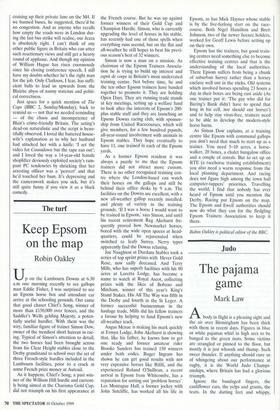The turf
Keep Epsom on the map
Robin Oakley
Up on the Lambourn Downs at 6.30 a.m one morning recently to see gallops man Eddie Fisher, I was surprised to see an Epsom horse box and attendant car arrive at the schooling grounds. Out came that good chaser Chief's Song, winner of more than 1150,000 over fences, and the Saddler's Wells gelding Majesty, a poten- tially useful hurdler. With them was the wily, familiar figure of trainer Simon Dow, owner of the trendiest short haircut in rac- ing. Typical of Simon's attention to detail, the two horses had been brought across from his Clear Height stables close to the Derby grandstand to school over the set of three French-style hurdles included in the Lambourn facilities, prior to a crack at some French prize money at Auteuil.
As it happens, Chief's Song, a past win- ner of the William Hill hurdle and current- ly being aimed at the Charisma Gold Cup, did not triumph on his first appearance at the French course. But he was up against former winners of their Gold Cup and Champion Hurdle. Simon, who is currently upgrading the level of horses in his stable, has recently had one of those spells when everything runs second, but on the flat and all-weather he still hopes to beat his previ- ous season's best of 32 winners.
Simon is now a man on a mission. As chairman of the Epsom Trainers Associa- tion he is trying to build up interest and esprit de corps in Britain's most underrated training centre. Not before time, he and the ten other Epsom trainers have banded together to promote it. They are holding Open Days. They are running trade stands at key meetings, setting up a welfare fund to look after the interests of Epsom's 200- plus stable staff and they are launching an Epsom Downs racing club, with sponsor- ship from United Racecourses, which will give members, for a few hundred pqunds, all-year-round involvement with animals in Epsom stables. They hope eventually to have 11, one trained in each of the Epsom yards.
As a former Epsom resident it was always a puzzle to me that the Epsom trainers did not attract more custom. There is no other recognised training cen- tre where the London-based can watch their horses on the gallops and still be behind their office desks by 9 a.m. The facilities on the Downs are excellent, with a new all-weather gallop recently installed, and plenty of variety in the training grounds. 'If I was a horse I would want to be trained in Epsom,' says Simon, and until his recent retirement Reg Alcehurst fre- quently proved how Newmarket horses, bored with the wide open spaces at head- quarters, could be rejuvenated when switched to leafy Surrey. Nervy types apparently find the Downs relaxing.
Joe Naughton at Durdans Stables took a series of top sprint prizes with Hever Gold Rose, now sadly deceased. And Terry Mills, who has superb facilities with his 80 acres at Loretta Lodge, has become a name to watch at Royal Ascot, collecting prizes with the likes of Bobzao and Mitcham, winner of this year's King's Stand Stakes. His All The Way was fifth in the Derby and fourth in the St Leger. A former successful businessman in the haulage trade, Mills did his fellow trainers a favour by helping to fund Epsom's new all-weather track.
Angus Mcnae is making his mark quickly at Ermyn Lodge, John Akehurst is showing that, like his father, he knows how to get one ready and former amateur rider Brooke Sanders has trained 150 winners under both codes. Roger Ingram has shown he can get good results with not very expensive horses like Rififi, and the experienced Roland O'Sullivan, a recent arrival in Epsom from Whitcombe, has a reputation for sorting out 'problem horses'. Les Montague Hall, a former jockey with John Sutcliffe, has worked all his life in Epsom, as has Mick Haynes whose stable is by the five-furlong start on the race- course. Both Nigel Hamilton and Brett Johnson, two of the newer licence holders, worked for Geoff Lewis before setting up on their own.
Epsom has the trainers, but good train- ing centres need something else to become effective training centres and that is the understanding of the local authorities. There Epsom suffers from being a chunk of suburban Surrey rather than a horsey enclave well out in the sticks. Old systems which involved horses spending 23 hours a day in their boxes are being cast aside (As one trainer put it: 'The guy who did for Baring's Bank didn't have to spend that long in his cell, nor should our horses') and to help stay virus-free, trainers need to be able to develop the modern-style horse barns.
As Simon Dow explains, at a training centre like Epsom with communal gallops you don't need that much to start up as a trainer. You need 5-10 acres, a horse- walker, 20 boxes, a chalet bungalow office and a couple of corrals. But to set up an RTE (a racehorse training establishment) you also need a warm response from the local planning department. And racing does not figure high among the town hall computer-tappers' priorities. Travelling the world, I find that nobody has ever heard of Epsom until you mention the Derby. Racing put Epsom on the map. The Epsom and Ewell authorities should now do what they can for the fledgling Epsom Trainers Association to keep it there.
Robin Oakley is political editor of the BBC.


















































































 Previous page
Previous page